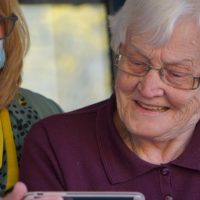The Berkshire Care Association (BCA) Care Awards are a celebration of care in all CQC registered Adult social care settings. The Homecare Awards recognise and promote best practice, dedication and support that staff dedicate to the people they serve across Berkshire. Whether delivering direct care or ensuring a service runs smoothly behind the scenes, the […]
Read MoreHave you ever stopped to think and ask yourself the question are hot water bottles dangerous? Why people use hot water bottles and what is the worry? In the cold of winter, we all look for ways to keep warm. With the price of fuel so high, many try to avoid having the heating on […]
Read MoreIt is not easy, caring for someone with dementia in a heatwave. For many people, warmer weather can cause discomfort, dehydration and distress. Those with dementia may find it difficult to take the steps we all take to help us cope in the heat. Here is some advice about caring for someone with dementia in […]
Read MoreIt is really important not to underestimate the importance of good hydration for those receiving care at home. How much water should we drink each day? The amount you should drink each day depends on several factors including climate, physical activity and diet. The UK Food Standards Agency recommends that “in a moderate climate, such […]
Read MoreChristmas is a time for families to come together. For families with loved ones who receive care, organising Care at Christmas can be a bit more complicated than usual. At Gardiner’s, our team will help our clients’ families to enjoy the festivities. Please do contact Gardiner’s if you would like us to help you or […]
Read MoreSmiling in care is important – it is a simple way to help yourself and others feel happier. We love this poem by the late, great Spike Milligan. Smiling Is Infectious by Spike Milligan Smiling is infectious, you catch it like the flu, When someone smiled at me today, I started smiling too. I passed around […]
Read MoreYou can’t fail to have heard about the current staffing crisis in care. In many ways, the past two or three years have been the perfect storm. At the start of this period, demand for care services was already significantly higher than the capacity available. Providers were already struggling to recruit staff. Brexit Many care […]
Read MoreAs a domiciliary care provider, lone working in care and the safety of our staff is paramount. At Gardiner’s Homecare, our staff travel to clients’ homes to offer help and support. Whilst our staff have round-the-clock support from the off team via our on-call service, they are nevertheless lone working in care and therefore potentially […]
Read MoreThe COVID-19 crisis has affected everybody, including Care Staff Wellbeing. Many of us have faced significant challenges, or are feeling anxious. At Gardiner’s we are always looking at ways we can support our workforce and will ensure a member of the office team is available for you to talk to, should you need it. This […]
Read MoreOften, a person with dementia may go walking about, this is frequently referred to as wandering. The term wander means to walk or move in a leisurely or aimless way and therefore it is perhaps a little unhelpful since people with dementia who go wandering will likely have a reason for it. Many of us […]
Read MoreOvernight care provides peace of mind and reassurance that you will be looked after whatever happens through the night. Care isn’t only needed during the day but often at night too. Your Care Workers will stay with you in your home throughout the night to assist and support you as and when needed. Gardiner’s team […]
Read MoreVitamin D supplements help to keep our bones, teeth and muscles healthy. Where do we get Vitamin D from? Our bodies create vitamin D from direct sunlight on the skin when outdoors. From Spring through to the end of Summer, most of us are able to get sufficient vitamin D from sunlight. However, from October […]
Read More











